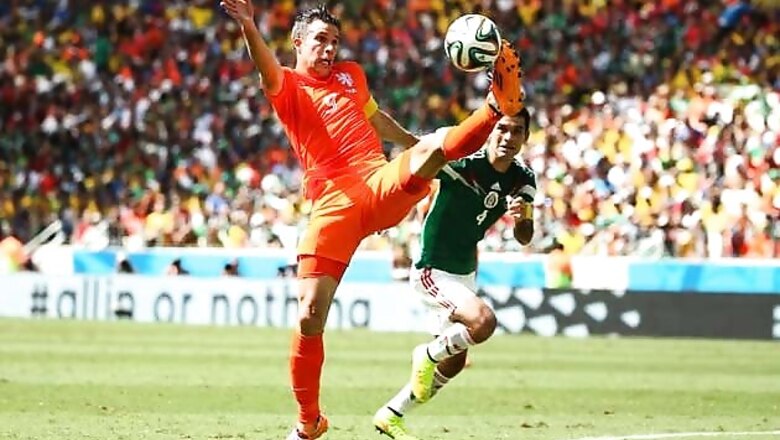
views
Rio de Janeiro: Since Day 1, when Brazil put three past Croatia, the World Cup has enjoyed a goal deluge as sustained as an Amazon forest downpour.
A combination of factors gelled to put Brazil on a trajectory to smash the record for most goals at any of the 20 World Cups.
The target to beat is 171, from France in 1998. That could be surpassed in the semifinals or July 13 final in Brazil. Already, the 154 goals here - with eight games still to play - are more than in South Africa in 2010 or Germany in 2006.
Naturally, having 32 teams - the format since 1998 - produces more goals than earlier World Cups with 24, 16 or as few as 13 teams.
But the ratio of 2.75 goals per game in Brazil is impressive, too. Organizer FIFA says that is the best average through this stage of the competition since 1986.
Here are reasons why goal-scorers have felt so at home:
FITNESS: Thank not just players but their fitness trainers, too. Teams prepared superbly for the heat, humidity and arduous travel between far-flung venues. Players are coping remarkably from the exertions and accumulated fatigue of a match every five or six days.
Better fitness and endurance is allowing teams to attack at higher speeds for sustained periods and to threaten for longer. Players wilted and cramped at some hotter venues and in games taken into extra time, but perhaps not as dramatically as they might have done 10 or 20 years ago.
"We thought that with the weather conditions here in Brazil ... teams were going to be very economical with the expenditure of efforts," said former Nigeria international Sunday Oliseh, now on a FIFA panel dissecting the play, tactical innovations and other on-field trends of this World Cup.
"It's been end-to-end stuff."
HOME ADVANTAGE: Teams from the Americas looked as comfy as Brazilian sunbathers on Copacabana beach, and swept up half of the last 16 places.
"The South American teams have got a sort of aggressive bite here which I don't see when they travel away from their base," said former Liverpool manager Gerard Houllier, also part of the FIFA study group.
FORWARDS ON FORM: Attackers who forgot to pack their scoring boots for South Africa brought them to Brazil. Arjen Robben and Robin van Persie scored three in total for the Netherlands in 2010. In Brazil, they've netted that many each before their quarterfinal chance to score more against Costa Rica.
Five goals made Germany's Thomas Mueller top scorer in 2010, but won't be enough in Brazil. James Rodriguez already has five for Colombia. Scoreless in South Africa, Lionel Messi has four for Argentina. So do Mueller and Brazil's Neymar.
"We think that one of the main reasons we have so many goals is because we have a generation of outstanding strikers," Houllier said.
TACTICS: Coaches have been rewarded for fielding attacking formations. Against Iran, Argentina started an awesome forward trio of Messi, Gonzalo Higuain and Sergio Aguero - almost too much firepower.
Some teams slimmed down to three players in defense, allowing full backs to roam forward, swamp the midfield and enable midfielders to then push into the danger zones too. Teams are turning defense into attack with lightning speed, as Chile did in humbling dethroned champion Spain 2-0.
"Some of the games have been like hockey or basketball, just going from one goal to another," Houllier said. "It's like a stream of players going forward."
Players possibly also felt an extra need for flair because Brazil is the land of football as art.
"Everybody has come out blazing," Oliseh said.
THE BALL: Players roundly criticized the 2010 ball for taking crazy dips and dives and even FIFA's study group noted it "picked up incredible speed." But the 2014 ball has worked fine, as Rodriguez proved with the best goal so far, chesting it down and volleying in. Teams got the ball months in advance to practice with it.
KNOWLEDGE SPREAD: With the globalization of football, the gap in skills and know-how between the best and worst teams continues to shrink. Supposed minnows proved to be piranhas in Brazil, unawed by their supposedly more illustrious prey.
Playing abroad brings experience that footballers repatriate to their national teams, strengthening them. Sage foreign coaches have helped, too. Costa Rica's 23 players work in 11 different countries and have a coach from Colombia. They beat former champions Uruguay and Italy, along with 2004 European champion Greece, on their way to their quarterfinals on Saturday.
"It's not easy to beat even the smaller nations. Everyone's improving and world football is evolving," France defender Mamadou Sakho said. "Everyone is improving technically, tactically and physically."



















Comments
0 comment